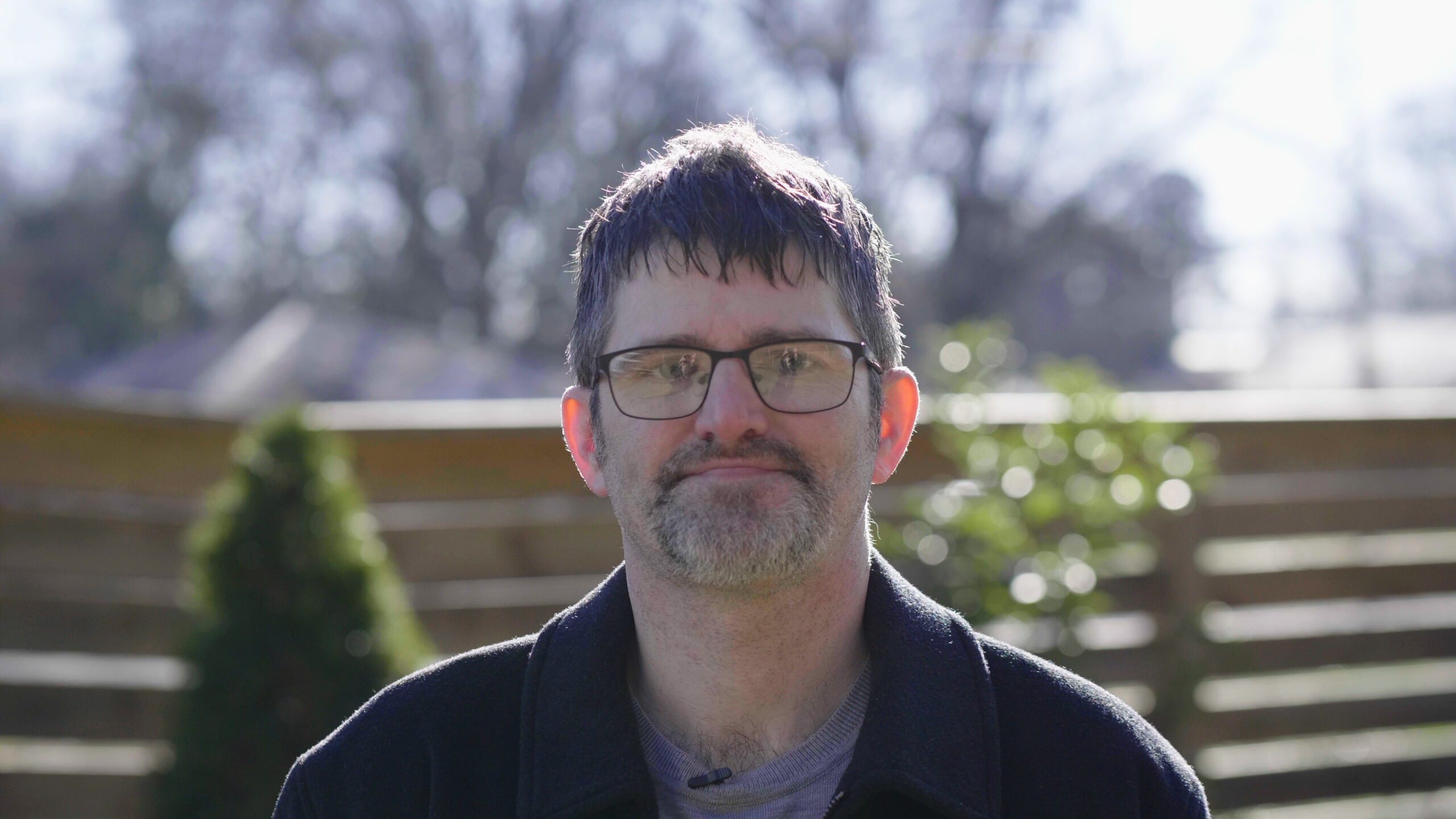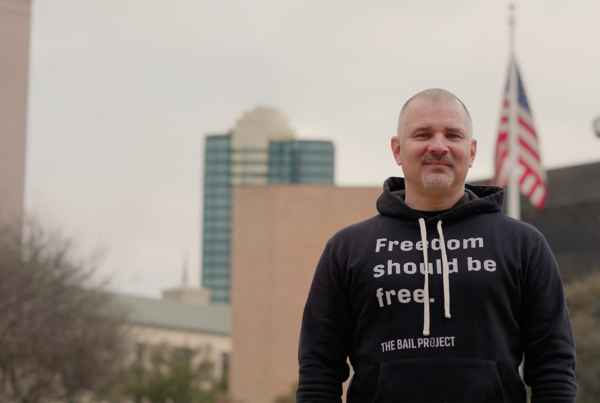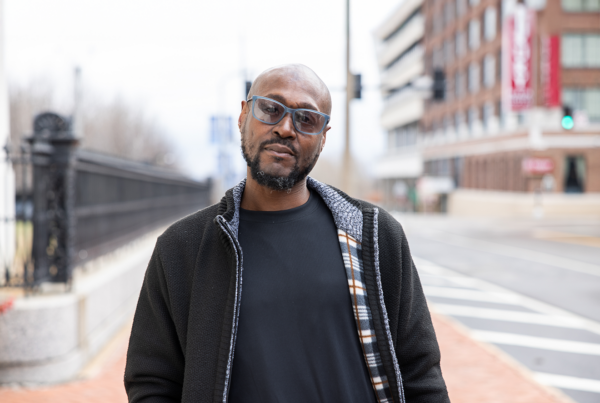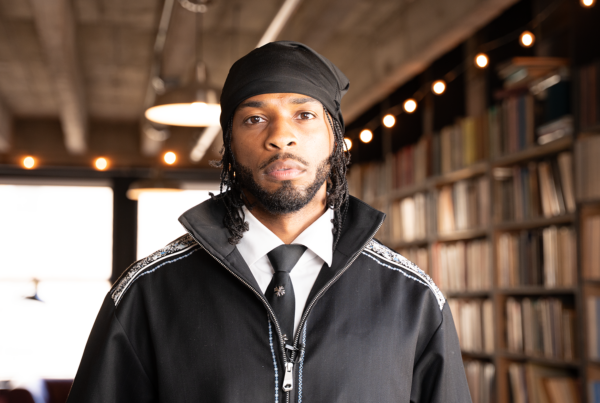Video Transcript
When I was in jail I felt really uh, of course I felt trapped. Because of the COVID-19 we were stuck in our cells 23 hours a day and only got to come out one hour a day. Just felt really cut off from people you know, stuck.
I’m David. I’m 42 years old and I’ve lived in Charlotte for 20 years. I like the weather. I like the people and there’s always stuff to do here. I like to go uptown Charlotte and just really walk around like the epicenter and shop, go to restaurants things like that. The NASCAR Hall of Fame is kind of cool. “And while the NASCAR Hall of Fame may look the same, our world like yours has certainly changed.” In jail the COVID-19 that’s where it actually like when I really noticed it for the first time because I mean it was, I was, it was scary. I mean there were plenty of uh plenty of people there that had it.
You know they had a whole section full of people that had it and then they would bring them back in after they were you know, supposedly cured or not sick anymore and so I mean it was it was always scary because you never know if you got COVID-19 in jail, you don’t feel like anybody’s really gonna care about it. I feel like they were keeping a lot of people there that didn’t need to be in jail, especially during something like that for really. I mean there were people that had been there for six, seven, eight months for things that you know if they had 500 bucks they could have got out of jail.
You know I’d never heard of The Bail Project until I was in jail for about a month and then somebody actually mentioned it to me. At first I didn’t think it was real you know. I thought there’s nobody that’s going to come you know get out of jail and not charge me with no catch or anything like that. So I had my dad call from the outside because I figured that would be easier. The next day I talked to him he said he had talked to a lady named Brenda who was super nice and within I think three or four days they had me, I was out. So I mean it was a really really good experience.
Since I’ve been out The Bail Project has been really I mean they’re really more supportive than public defenders or anybody. I mean every time I have had a court date I got a phone call you know reminding me and offering if I needed a ride I was offered a ride to it so uh and they definitely continued to follow up with me. I think it’s the way that they, the system forces people to stay in jail just due to the fact that they don’t have money is super unfair because you know when I was out the guy that was beside me was in there for like a small theft charge. He’d been there for several months but at the same time a guy with drug trafficking charge that had the you know ten thousand dollars to throw down he was out in seven hours you know so it was definitely uh unfair.
In the South you have money people treat you a lot different than if you don’t. You’re definitely looked down upon if you don’t have money. You’re definitely treated more unfair almost like you don’t count. It doesn’t really matter about who you are or what you have going on in your life it really just matters about what you have in your pocket. I definitely think the South is a great place for The Bail Project because I mean just, just being in jail and looking at the people that are in there, I mean I would, when I was there I would say that 50 or 60 percent of the people had low cash bonds that you know just needed one, two hundred dollars and they could have gone home. And instead they were in there losing their jobs, messing up things at home, really causing a lot of more problems than a hundred dollars. And I would assume that cost more than a hundred dollars to keep them in there.
You meet a lot of good people in jail and everybody tells you their story and you, you know it’s just amazing that there’s people in there of all, old guys, young guys, people in the middle that have been there for five, six, seven months for the stuff that they’ve been there for you know. I mean a lot of it doesn’t even really seem like you know they should even been arrested for it. The South’s a great place you know. You know it’s a really good place to live and grow up you know just, try not to get in trouble here, you know unless you have plenty of money.
To curb the spread of Covid-19 in jails, correctional staff in many jurisdictions chose to separate incarcerated individuals by confining them to their cells, sometimes for up to 23 hours each day. The harmful effects of isolation, which is typically used as punishment, are well known. David, a 42-year-old man from Charlotte, NC, explains his health concerns and the fear and loneliness he experienced while being held in Mecklenburg County Jail as a result of that Covid-19 policy. He also shares how the criminal justice system punishes people experiencing poverty.
Thank you for engaging with our content. People like you make a better world possible – a world where justice is not determined by someone’s wealth. The Bail Project is not only an immediate lifeline for people held on unaffordable cash bail, but a growing megaphone for public education and social change. If you have the means and found value in our content, please consider becoming a donor today.











